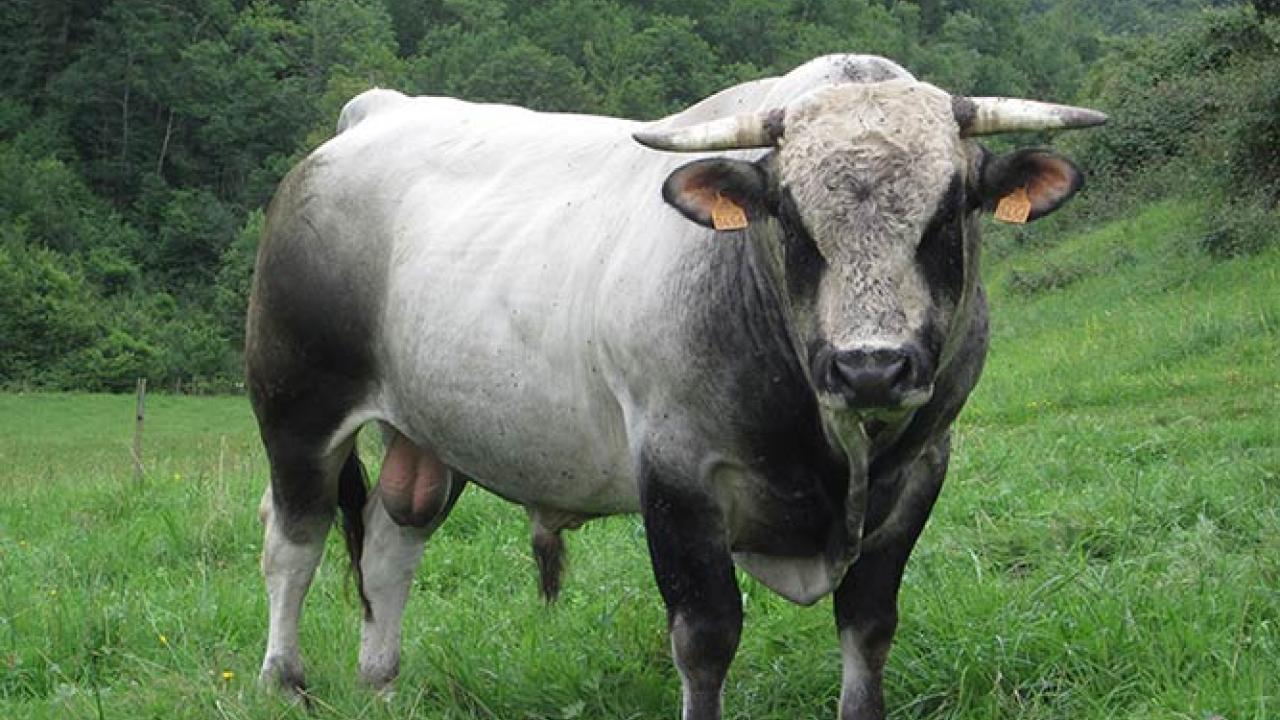
UC Davis Helps Nevada Rancher Introduce Gascon Cattle to United States
When rancher Paul Plouviez—owner of the 600,000-acre Bench Creek Ranch east of Fallon, Nevada—noticed that much of the mountainous areas of his large ranch were underutilized by his cattle, he thought back to his native France. He noticed that the terrain and climate of the area, with its extremely hot summers and cold winters, closely resembled the Pyrenees mountain range in southern France. He thought Bench Creek Ranch might be ideal land to raise Gascon cattle, a breed which thrives in the Pyrenees.
“The Gascon is a rustic breed originally found in the Pyrenees and, consequently, a suitable fit for the arid and harsh conditions of Nevada open range,” said Plouviez.
In order to accomplish this feat of introducing a new breed of cattle into the United States, Plouviez imported Gascon embryos with hopes of implanting them in American cattle, as well as Gascon semen to be used in a cross-breeding venture.
“I imported the first embryos in 2012,” said Plouviez. “Finding a large quantity of embryos in Europe that met U.S. standards was difficult due to the Schmallenberg virus in Europe, but we managed to import several dozen.”
Plouviez also found a large quantity of semen collected in France prior to 2011, before the appearance of the virus. With that Gascon semen, he experimented crossbreeding Gascons with Black Angus, Red Angus and Limousine cattle.
“We found that the best result lies with Black Angus, and it results in black calves with no horns,” said Plouviez. “We are calling this crossbreed Black Gascon, and we believe it combines the best qualities of each breed.”
The Black Gascon can climb and roam the open ranges of Bench Creek Ranch without any problems. The Angus and other breeds hesitate to do so. This allows the Black Gascon to continually roam the ranch in order to feed themselves, into areas the Angus won’t go.
Most importantly, though, the quality of the meat is superior.
“It has a richer, darker red color, a delicate flavor, and an unsurpassed tenderness,” said Plouviez.
As for the embryos, Plouviez wasn’t having much initial success in producing many viable calves, so he reached out to the UC Davis School of Veterinary Medicine for their expertise. Dr. Bret McNabb, chief of the Livestock Herd Health and Reproduction Service at the school’s teaching hospital, along with staff veterinarian Dr. Catalina Cabrera, were eager to help.
“Paul was only having about a 10 percent success rate with his initial implantations, yielding just a few calves,” said Dr. McNabb. “Normally, we like to see a 40-50 percent return. We were confident we could help him improve his odds.”
In the fall of 2014, a UC Davis team of veterinarians and students made several trips to Bench Creek Ranch. In total, they implanted 25 Gascon embryos into Angus surrogates. By the summer of 2015, that resulted in 14 healthy pure Gascon calves.
This success has helped Plouviez quickly increase his ever-growing Gascon and Black Gascon herds. At this time, he is keeping all the pure Gascon heads in order to quickly increase the purebred herd. His pure Gascon bulls have allowed him to start selling Gascon bull semen for crossbreeding, as well as increase his own Black Gascon herd.
“We turn the Gascon bulls out with the cows on a multiple sire basis the first of May at the rate of 15 to 20 cows per bull,” said Plouviez.
To help market the Black Gascon meat (and later the Gascon meat), Plouviez opened Butcher Boy Meats, a wholesale and retail butcher shop in Reno. He is also working with supermarkets and restaurants in Nevada, Arizona and California to introduce this new delicacy to West Coast meat lovers.
# # #
